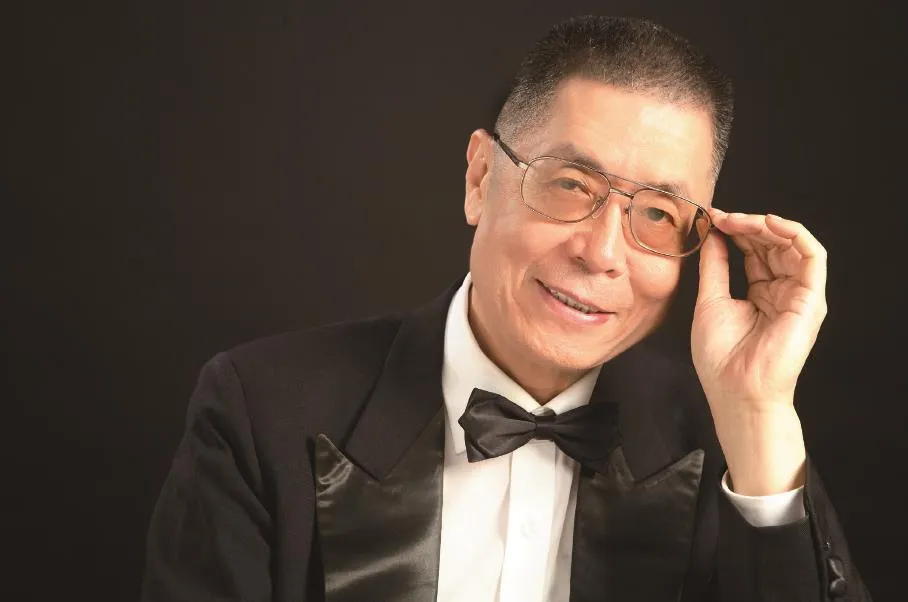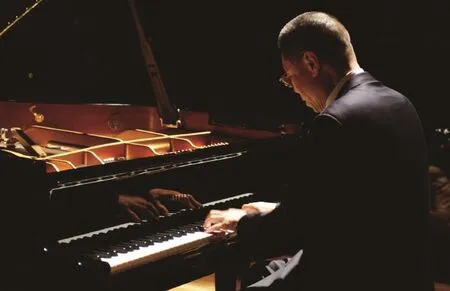LIU SHIKUN AESTHETlC EDUCATlON MATTERS
Text by Madeline Weng Photos by Zeng Jian and Liu Shikun Translation by Shi Yu
LIU SHIKUN AESTHETlC EDUCATlON MATTERS
刘诗昆:美育成国家战略是件好事
Text by Madeline Weng Photos by Zeng Jian and Liu Shikun Translation by Shi Yu

N: NIHAO
L: LIU SHIKUN
N: Though they excel in technique, some Chinese pianists are criticised by some western critics for failing to interpret what's within the music. What do you make of this?
L: Well, this statement was brought up back in the 1950s, when Stalin was in control of the Soviet Union. Technically, techniques and emotions are bonded together. They're inseparable. Piano performance is mostly about the performer's tempo and techniques. If your tempo is nice and fast and your music sounds pleasant, that means you make it both technical and emotional.
N: As a man who witnessed modern China's great changes, and as a man who has met many Chinese and foreign leaders, how do you define a successful life? What kind of a man do you want to become?
L: I never thought about that. I only ask myself to
achieve three points: do things as much as I can, aslong as I can and as well as I can. I was wrongly put into jail for six years. I know how it's like when you hit the lowest bottom of your life. So now I have peace of mind. I won't be so hard on myself. I won't be laden with grief and regret.
I have connections in various fields. In the science field, I have Franklin Yang (well-known physicist), Yuan Longping (outstanding hybrid rice expert), QianWeichang (well-known dynamicists and applied mathematician). In the literature circle, I have Mo Yan, FengYicai, Wang Meng. I also have Han Meilin within the art circle and Yan Bin within the business circle. They are all my friends. Of all the people I know, few of them come from the music fi eld; and my friends from popular music circles are not less than those from classic music circles. I admire them for they are well up in what they do.
However, there is a strange phenomenon going on in China right now: negative images always get more hits than positive ones. Pharmaceutical chemist Tu Youyou, whom I respect so much, discovered artemisinin and made it possible to save about one and a half million lives a year in Africa. But her Nobel Prize winning news still had to make room for the headlines of some celebrity's luxury wedding.
I think young people should learn something down to earth. Do whatever they can with honesty, dedication, earnestness and perseverance. At the same time, I also respect workers from the bottom of society, because they are really making contributions. When it comes to working, hierarchy doesn't really matter. What matters is how signifi cant and excellent the contribution is.
N: China has the most piano students around the world. Also, in North America, Hong Kong, Singapore and other areas, there are more overseas Chinese children taking piano sessions compared to native children. What do you make of this trend of learning to play the piano?
L: The West used to focus on aristocratic education. Now that they've reached a bottleneck in terms of music education, they start to promote science education. However, the current generation of parents in China have gone through poverty and political upheavals (a time when pianos were being burnt). They didn't catch the chance to learn to play the piano and now they are hoping that their kids can fulfi ll that dream for them. When I was young, there were only five cities in China that had piano education. But now we have piano education everywhere, from the east to the west.
As long as a country wants to maintain a sustainable development, it has to focus on improvement of its citizen's cultural qualities. The central government has been investing great efforts into the elimination of illiteracy. From President Hu Jintao to President Xi Jinping, they have been stressing on “nurturing a new generation of Chinese that are comprehensively educated.” The State Council had also issued a document featuring how aesthetic education plays a vital and unique role in education as a whole. Putting aesthetic education on the national strategy list is a good thing.
As a major way of aesthetic education, piano education can definitely improve a child's all-round quality. As an ancient Chinese saying goes: “Ten fingers are connected to the heart”, by heart we actually mean brain. Moving your fingers quickly is a way to enhancethe agility of your brain. That's why some elder Chinese like to grind walnuts with their hands.

N: Can you give some advice to the young learners and their parents?
L: Firstly, the piano is not just for the talented to learn. If those who learn physics have to become Albert Einstein, we're better off learning nothing. If everybody becomes the emperor, then everybody is the servant—because a thing is precious only when it is scarce.
Hong Kong has the highest percentage of young piano learners in the country, but parents are the least strict on their kids. This is right. Parents should always focus on whether their kids are enjoying themselves instead of being anxious for success. Music can be a part-time hobby. The fi rst violin solo of China was composed by Li Siguang a well-known Chinese geologist. Sir Edward Heath, Prime Minister of the United Kingdom from 1970 to 1974, once conducted the London Symphony Orchestra.
Secondly, kids are mostly forced to learn to play the piano. It's very normal for a kid if he/she doesn't like to practice. I myself actually was not really a fan of the piano when I was little. Interest doesn't really determine the performance.
Last but not least, parents need to create an on-stage performing chance for their kids once in a while. Actually, kids have bigger performance desire than adults do. On-stage performances can help them develop their stage style and an outgoing personality.
N: How do you think of pop music?
L: Classical music and popular music are all indispensable arts forms. Each has its own characteristics. Though I'm in classic music, I don't have narrow preference. Although classical music is higher than pop music in the hierarchy of culture and arts, pop music doesn't have to be vulgar. Personally, I do enjoy Michael Jackson's rhythm.
Recently, there is an emerging trend to combine classic music with pop music. For example, Andrea Bocelli can perform a great duet with pop singers. This is a good trend. I believe music is supposed to be diversifi ed.
Arts are hierarchically arranged like a pyramid in this society, because what's on the top is usually the hardest to appreciate. You can't expect most young people to listen to Bach and Beethoven at their leisure. My son and my granddaughter like listening to songs by Jay Chou (Taiwanese pop star) rather than me playing the piano. That's true. However, talking about the culture development of a country, we'd better stay focused on promoting and spreading high-end art forms.
N:一些西方乐评家批判中国钢琴家拥有高超的钢琴技巧,却诠释不出乐曲的感情,对此你怎么看?
L:这个说法是50年代苏联斯大林时代提出的概念。实际上,演奏技巧和感情是统一不可分割的。钢琴演奏大部分都需要靠速度和技巧。弹得快,以及听起来舒服,都是因为技巧和感情同时到位了。中国有不少优秀的少壮派钢琴家,比如王羽佳,他们中很多人只是没有碰到好的机遇。
N:作为一个见证了中国近代历史巨变的人,你接触过许多中外领导。你怎么定义成功人士的人生?你想要成为什么样的人?
L:我从来没想过要成为什么样的人。我只要求自己做到这三点:能做多少做多少,能做多久做多久,能做多好做多好。我年轻的时候坐了六年冤狱,品尝过人生最底层的味道,所以我的心态比较平和,不会对自己的人生抱有过高的苛求,也不会有什么忧伤和悔恨。
我的人脉涉及的领域很广。科学界的杨振宁、袁隆平、钱伟长,文学界的莫言、冯骥才、王蒙,美术界的韩美林,商界的严彬。他们都是我的好朋友。在我认识的人群中,音乐界的反而占少数;而流行音乐界的人脉并不少于古典音乐界。对于这些在各自领域有造诣的人,我都赞赏和佩服。
我认为年轻人还是应该实实在在地学点东西,诚信、敬业、踏实、努力地做力所能及的工作。我特别尊重做得好的底层工作者,因为他们在为社会作贡献。工作没有等级之分,只有成就大小和优劣之分。
N:中国学琴人数已经成为世界公认的第一。在北美、香港、新加坡等地学钢琴的华侨子女的平均人数大大超过了本土子女的平均学琴人数。你怎么看当代中国的学琴热?
L:以前的西方教育属于贵族化教育,而现在美国、欧洲在音乐教育上达到了瓶颈,开始提倡自然教育。而中国的家长一代经历了贫穷和政治动乱(火烧钢琴的时代),没有机会学钢琴,因此希望孩子能够替他们圆梦,长大后比他们的文化素质高。我小时候,中国只有5个城市有钢琴教育;而现在,从一线、二线到西部等地的钢琴教育都发展得很好。
一个国家要想可持续发展,就必须重视提高人的素质。中央一直在加大投资以消灭文盲,把美育放到了国家战略,这是件好事。
N:你可以为琴童和家长提一些学琴建议吗?
L:首先,不是只有天才才能学钢琴。如果学物理的都成了爱因斯坦,学语文的都成为巴金,学数学的都成为华罗庚……如果是这样,大家都别学了!
香港学琴的孩子的比例在全国最高,但是他们的家长对孩子的要求最低。实际上这是对的。家长应该抱着让孩子陶冶情操的心态,不应急于求成。音乐可以是一门业余爱好。中国第一首小提琴曲是地质学家李四光的作品,英国70年代初的首相希斯曾经指挥过伦敦交响乐团。
其次,儿童学习基本上都是强制性的。孩子不喜欢练琴是正常现象,我小时候就是对钢琴没兴趣的代表。弹得好不好,和喜不喜欢没有直接联系。最后,家长可以适当为他们创造一些上台机会。实际上,小孩的表现欲比大人更强。上台表演可以帮助他们培养台风,并成为一个开朗的孩子。
N:你怎么看流行音乐?
L:经典文艺、严肃音乐和通俗音乐都是世界上缺一不可的文艺形态。虽然古典音乐的整个文化层次和文艺级别比通俗音乐更高,但通俗音乐并不都是低级的。比如说,我个人特别喜欢迈克尔·杰克逊的节奏。
我认为音乐要多元化。近期,音乐界还出现了一个将古典音乐和流行音乐融合的趋势。比如,波切利介于两者之间,和流行歌手合唱时可以达到高度的融合。这是一个好的趋势。
任何社会的文艺都是金字塔形的,你不能要求多数年轻人茶余饭后都去欣赏巴赫、贝多芬。我的儿子、小孙女并不喜欢听我弹琴,他们更喜欢听周杰伦的歌,这是事实。但从一个国家、民族的文艺前进方向来讲,还是要注意推广和弘扬高端文艺。

